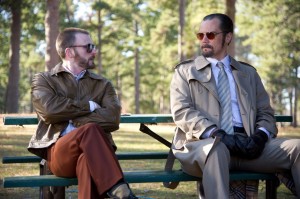Oftentimes method actors slip through the cracks, and before we realize it an actor establishes him or herself as a force to be reckoned with. If this is true, there can be no greater exhibit for the defense than the seemingly overnight shift from unheard-of performer to accomplished actor for Michael Shannon, who has appeared in a half-dozen films over the last couple years, from independent-born films like “Take Shelter” and “Mud” to big name blockbusters such as “Man of Steel” and “Premium Rush.” His latest effort, filling the shoes of cold-blooded killer Richard Kuklinksi in Aierl Vroman’s “The Iceman” may be his best effort yet. The film is both sinister and engaging, combining successful elements of famous mob-hits like “Goodfellas” with tragic serial killer chronicles such as “Bundy.”
Ironically, what works about “The Iceman” is the same type of thing that doesn’t work for so many movies that often don’t know what kind of film they are trying to be. “The Iceman” is neither a detailed study of the mafia, nor is it a self-gratifying look at a real life serial killer. It is about a man drawn to murder, a man who seems to have no reaction to it, and a man who is hired by men that don’t fully understand him. However, it is no less engaging, and presents a dark look into its antagonist’s often-chaotic mind.
Shannon plays the titular character, and when we first see him he is on a quiet date with a seemingly gentle woman (Winona Ryder), who would later become his wife. However, before we can decide if Kuklinski is a nice guy or not, we see a billiards game at a bar that ends with one man’s initial refusal to pay. Kuklinski repays this insult by following him to his car, slitting his throat, and walking away quietly as if nothing had happened. The act is done not in anger, but in obligation. There is horror in Kuklinski’s actions, but the horror is that it’s done with the nonchalance of taking out the trash. That Kuklinski is soon hired by a man with mafia ties, Roy (Ray Liotta) to be a hit man for the mob almost legitimizes his actions. However, as Roy and others soon realize, there is something that makes Kuklinski tick that maybe no one can understand.

“The Iceman” succeeds on several levels, most notably the great acting brought forth by Shannon, and the era of the 1970s/’80s that it seamlessly recreates. The film takes pains to paint Kuklinski as a family man, hiding his vicious secret from his wife and two little girls. When Kuklinski says his family is the only thing in the whole world he cares about, we believe him. However, a terror underscores this love – how far will this man go to protect them?
Kuklinski, who got his nickname The Iceman from freezing his victims using various methods to disguise the time of death, had a widely vast murder repertoire which Vroman’s film displays with detail. Shootings, knifings, poisonings, and hanging men by a rope that Kuklinski stretches over his shoulder line the film’s run-time, as does his dealings with an unlikely ally, a fellow hit-man played by “Captain America” alum Chris Evans. The hits these men perform, violent, vicious, and sardonic are contrasted with the mirage of the wholesome family man Kuklinski tries so hard to cast. A visit to his imprisoned brother further highlights the fine line Kuklinski rides; it’s not skill but chance that separates him from less successful killers rotting in jail, and he begins to realize what he cares about most rests on a house of cards that could be blown away at any moment.
Michael Shannon absolutely owns his portrayal of Kuklinski, presenting a madman that doesn’t quite realize he is mad, in a performance that is both terrifying and captivating. Other true-life mafia stories, such as “Goodfellas” or “Casino” gain our interest because the characters are almost heroic, or at least legendary. However, in “The Iceman,” Kuklinski’s reign existed only as long as his secret life. The things he does he regrets; not because he feels sympathy for his victims, but because he fears it will hurt his family. Shannon instills a sense of cold detachment in Kuklinski that feels both foreign and spot-on. It’s clear he doesn’t feel remorse, but he appears to feel love. It’s a concept that doesn’t sit right with a man responsible for 100 murders.
– by Mark Ziobro


1 Comment
Thought the film was a little slow but overall not bad.